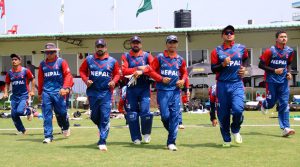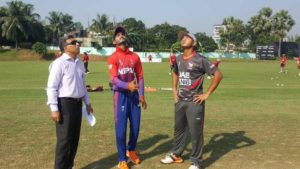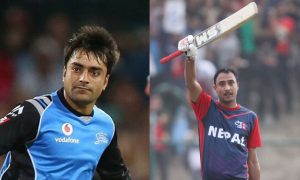
Ashok Nath Pyakurel is a member of the advisory committee formed by the International Cricket Council to recommend amendments to the statute of the Cricket Association of Nepal formed by the world governing body of the sport to prepare grounds for lifting a suspension against CAN.
According to the ICC, important agreements have been reached between a faction led by Pyakurel and its rival one led by Binay Raj Pandey. The ICC has also told the committee to prepare for elections. In this context, Onlinekhabar’s Raj Kumar Shrestha talked to Pyakurel on the fate of the advisory committee’s recommendations. Excerpts:
The ICC has said that an important breakthrough has been achieved in negotiations over the CAN dispute. So, have all thorny issues been settled?
Almost all contentious issues have been resolved. A lot of effort has been put in the last 5-7 months to forge an agreement. As of today, we have achieved a lot. There were a lot of issues related to CAN’s statute, and it had to be discussed with all stakeholders of the game. That was why this was not something that could be resolved in a matter of seconds.
The last time we wrote to the ICC, we had differences over two issues, out of which one has almost been settled.
So, is the issue that has been settled related to the voting rights of the members of the district committees?
We have maintained that every district committee should get to send a representative to the general assembly, and this has been agreed upon. The original proposal said that two districts will send one representative to the assembly. But district committees form the very basis of cricket in Nepal, and each of them should have a voting right in the assembly.
The second of the contentious issues is related to the transitional mechanism that will govern the sport before elections can take place.
We know that this is Nepali cricket’s transitional phase and we are on a campaign to resolve the problems facing the game. All stakeholders have given up some of their demands so that an agreement can be reached. We are also of the opinion that the process should not be stalled.
Having said that, we cannot forget that that the ‘sitting committee’ in Nepal’s cricket association is the ‘elected CAN’. However, the committee is under suspension. If the committee is not allowed to become a part of the AGM, the transitional process will not be smooth.
The ‘elected’ CAN is the link between the ‘old’ AGM and the ‘new’ AGM. We cannot get rid of the old AGM. Doing so will also be against the ICC’s ToR for the advisory committee.
So, if this is the only issue that is keeping you from reaching a consensus, why don’t you give it up?
This is an issue of principles. The old statute is still in force until it is replaced by a new one. Cricket Association of Nepal is an active body, it cannot be left in vacuum. That is why we have been saying that we need to amend the statute and get it approved by the AGM.
We (the members of the ‘elected’ CAN) are ready to give up our voting rights in the AGM, if other people feel that we might influence the outcome.
The ICC has given you a month to reach a conclusion. What will you do now?
We do not want to hold cricket hostage over the issue. We will notify the ICC and the government that we have reservations on this issue and allow the process to move ahead.
When the AGM is called, is it certain that it will approve the recommendations of the committee?
The AGM might not give its stamp of approval to every recommendation we make. It would be our moral responsibility to get the recommendations approved.
The other thing we need to remember is that the National Sports Council will also have its say on the amendments. Even it could demand changes to the amendment.
We could amend the statute and send it to the NSC. But, (as we have been saying during our meetings with the ICC), if there are unresolved issues that we cannot address, it will be difficult for us to take moral responsibility of the draft amendment.























